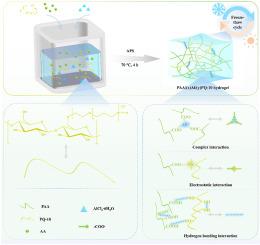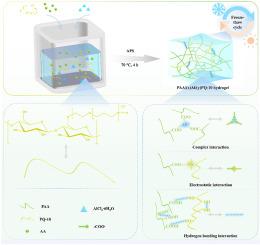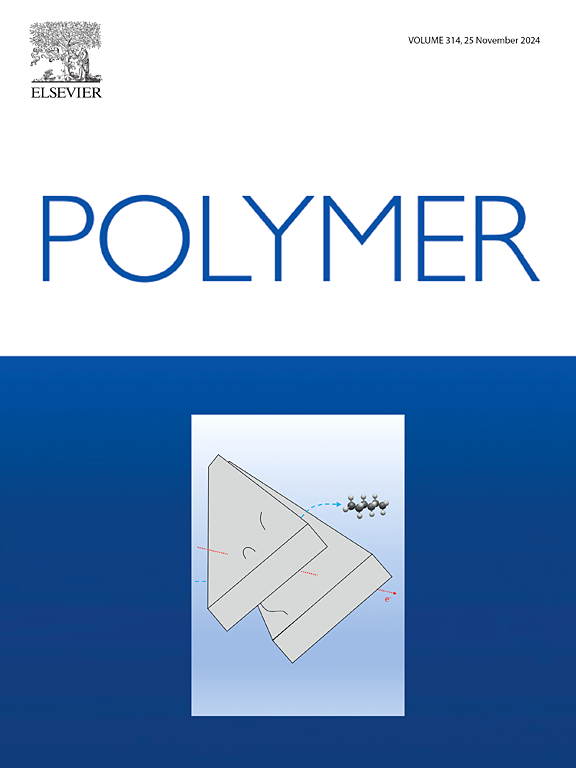可回收、高强度、电气机械自修复可穿戴离子水凝胶传感器
IF 4.1
2区 化学
Q2 POLYMER SCIENCE
引用次数: 0
摘要
离子水凝胶是人体可穿戴传感器的理想材料,通常要求具有出色的机械性能、粘附性、自愈性和传感能力。然而,增强离子水凝胶机械性能的传统方法往往会影响其自愈合和传感性能。有鉴于此,在本研究中,我们开发了一种具有宽监测范围的高强度可回收水凝胶,由丙烯酸、六水合氯化铝和聚季铵盐-10配制而成。通过采用简单的冻融过程,水凝胶的拉伸强度从 0.3 兆帕显著提高到 1.89 兆帕,断裂伸长率从 900% 提高到 1400%。此外,该水凝胶还对各种基底具有优异的粘附性,并具有机械、电气双重自愈特性。水凝胶广泛的应变检测范围(1%-400%)进一步凸显了其在高性能传感应用方面的潜力。此外,水凝胶的可重构、高密度超分子网络还能通过直接的水膨胀处理将废弃材料再加工成高附加值产品。我们相信,我们的方法为增强基于丙烯酸的水凝胶传感器的机械性能提供了一种直接有效的策略,更重要的是,它有助于水凝胶材料的可持续利用。本文章由计算机程序翻译,如有差异,请以英文原文为准。


Recyclable, high strength and electrical-mechanical self-healing wearable ionic hydrogel sensor
Ionic hydrogels are ideal materials for wearable sensors on the human body, typically requiring excellent mechanical properties, adhesion, self-healing, and sensing capabilities. However, traditional methods to enhance the mechanical properties of ionic hydrogels often compromise their self-healing and sensing performance. Considering this, in this study, we developed a high-strength, recyclable hydrogel with a wide monitoring range, formulated from acrylic acid, hexahydrate aluminum chloride, and polyquaternium-10. By employing a simple freeze-thaw process, the tensile strength of the hydrogel was significantly increased from 0.3 MPa to 1.89 MPa, and the elongation at break was enhanced from 900 % to 1400 %. Additionally, the hydrogel demonstrates exceptional adhesion to various substrates and possesses mechanical-electrical dual self-healing properties. The hydrogel's broad strain detection range (1%–400 %) further underscores its potential for high-performance sensing applications. Furthermore, the reconfigurable, high-density supramolecular network of hydrogels enables the reprocessing of discarded material into value-added products through a straightforward water swelling treatment. We believe that our approach offers a straightforward and efficient strategy for enhancing the mechanical properties of acrylic acid-based hydrogel sensors and, more significantly, contributes to the sustainable utilization of hydrogel materials.
求助全文
通过发布文献求助,成功后即可免费获取论文全文。
去求助
来源期刊

Polymer
化学-高分子科学
CiteScore
7.90
自引率
8.70%
发文量
959
审稿时长
32 days
期刊介绍:
Polymer is an interdisciplinary journal dedicated to publishing innovative and significant advances in Polymer Physics, Chemistry and Technology. We welcome submissions on polymer hybrids, nanocomposites, characterisation and self-assembly. Polymer also publishes work on the technological application of polymers in energy and optoelectronics.
The main scope is covered but not limited to the following core areas:
Polymer Materials
Nanocomposites and hybrid nanomaterials
Polymer blends, films, fibres, networks and porous materials
Physical Characterization
Characterisation, modelling and simulation* of molecular and materials properties in bulk, solution, and thin films
Polymer Engineering
Advanced multiscale processing methods
Polymer Synthesis, Modification and Self-assembly
Including designer polymer architectures, mechanisms and kinetics, and supramolecular polymerization
Technological Applications
Polymers for energy generation and storage
Polymer membranes for separation technology
Polymers for opto- and microelectronics.
 求助内容:
求助内容: 应助结果提醒方式:
应助结果提醒方式:


